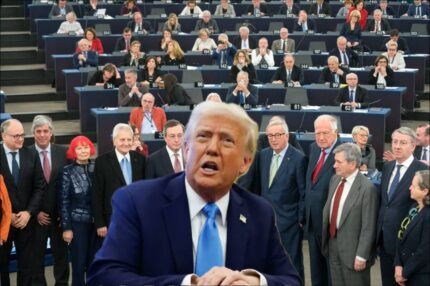European leaders have strongly condemned U.S. President Donald Trump’s decision to impose sanctions on officials of the International Criminal Court (ICC), warning that the move could undermine global justice efforts.
A spokesperson for the French Foreign Ministry reaffirmed France’s unwavering support for the ICC, emphasizing that Paris would mobilize alongside its international partners to ensure the court remains independent and impartial. “We stand with the ICC in its crucial mission to investigate and prosecute war crimes, crimes against humanity, and genocide,” the spokesperson stated.
Dutch Prime Minister Dick Schoof, whose country hosts the ICC in The Hague, described the sanctions as a “disturbing signal” with potentially significant consequences. “As the host country, we have a responsibility to guarantee the unhindered functioning of the court at all times,” Schoof told reporters. He added that the Netherlands would continue to support the ICC despite Washington’s punitive measures.
Scholz: ICC Essential for Holding Dictators Accountable
Speaking at a campaign event, German Chancellor Olaf Scholz condemned the sanctions, calling them “the wrong tool” to address any concerns the U.S. may have with the court. He warned that the measures could weaken an institution designed to ensure that world leaders cannot commit atrocities without consequences.
“They jeopardize an institution that is supposed to ensure that the dictators of this world cannot simply persecute people and start wars,” Scholz said. “That is very important.”
Legal and human rights experts have raised concerns that the U.S. move could embolden autocratic leaders worldwide by limiting the ICC’s ability to investigate crimes against humanity. Amnesty International’s Secretary-General, Agnes Callamard, described the sanctions as an attempt to dismantle a system of accountability that has been built over decades. “These measures seek to undermine and destroy what the international community has painstakingly constructed,” she said.
Global Justice at Risk as Investigations Face Disruptions
Experts warn that targeting ICC officials could severely impact ongoing investigations into war crimes in conflict zones such as Afghanistan, Ukraine, and Sudan. If the sanctions directly affect the International Criminal Court’s prosecutor, Karim Khan, key cases could be stalled or even abandoned.
“This will undermine all investigations, not only the one into Palestine,” international law expert Mark Sexton told AFP. He added that victims of war crimes, including those in countries where the U.S. has no objections to ICC involvement, could be denied justice.
The timing of the sanctions is also critical, as the ICC has been facing challenges on multiple fronts. Recently, Italy refused to extradite a Libyan war crimes suspect, citing legal concerns over the International Criminal Court’s warrant. Meanwhile, some countries have expressed reluctance to arrest Israeli Prime Minister Benjamin Netanyahu if he travels abroad, despite the court’s recent arrest warrant.
Europe Stands Firm as Some Nations Back Trump’s Actions
While European nations have united in defense of the ICC, some countries have sided with the U.S., claiming the court has become a politically motivated institution. Hungary and Israel, in particular, have supported President Trump’s stance, arguing that the International Criminal Court unfairly targets their allies.
However, a coalition of nearly 80 countries, including the United Kingdom, Germany, and France, has issued a joint statement reaffirming their commitment to the court. “We reaffirm our continued and unwavering support for the independence, impartiality, and integrity of the ICC,” the statement read.
The European Commission also reiterated its commitment to the ICC’s mission, emphasizing the need for an impartial international legal system. “The European Union remains dedicated to upholding the rule of law and ensuring accountability for war crimes,” a spokesperson said.
The ICC Faces a Critical Moment
The U.S. sanctions mark a turning point for the International Criminal Court, with some analysts warning that the court faces an existential crisis. “This is a make-or-break moment for the International Criminal Court,” Sexton cautioned. “If key nations do not push back against these sanctions, the court’s authority could be permanently weakened.”
Despite these challenges, the ICC has vowed to continue its work, stating that justice for victims of war crimes cannot be compromised by political pressures. “We will not be intimidated,” an ICC spokesperson said in response to the sanctions.
The situation remains fluid, with diplomatic efforts underway to counter the impact of the U.S. measures. As tensions escalate, the future of the International Criminal Court—and the broader system of international justice—hangs in the balance.














